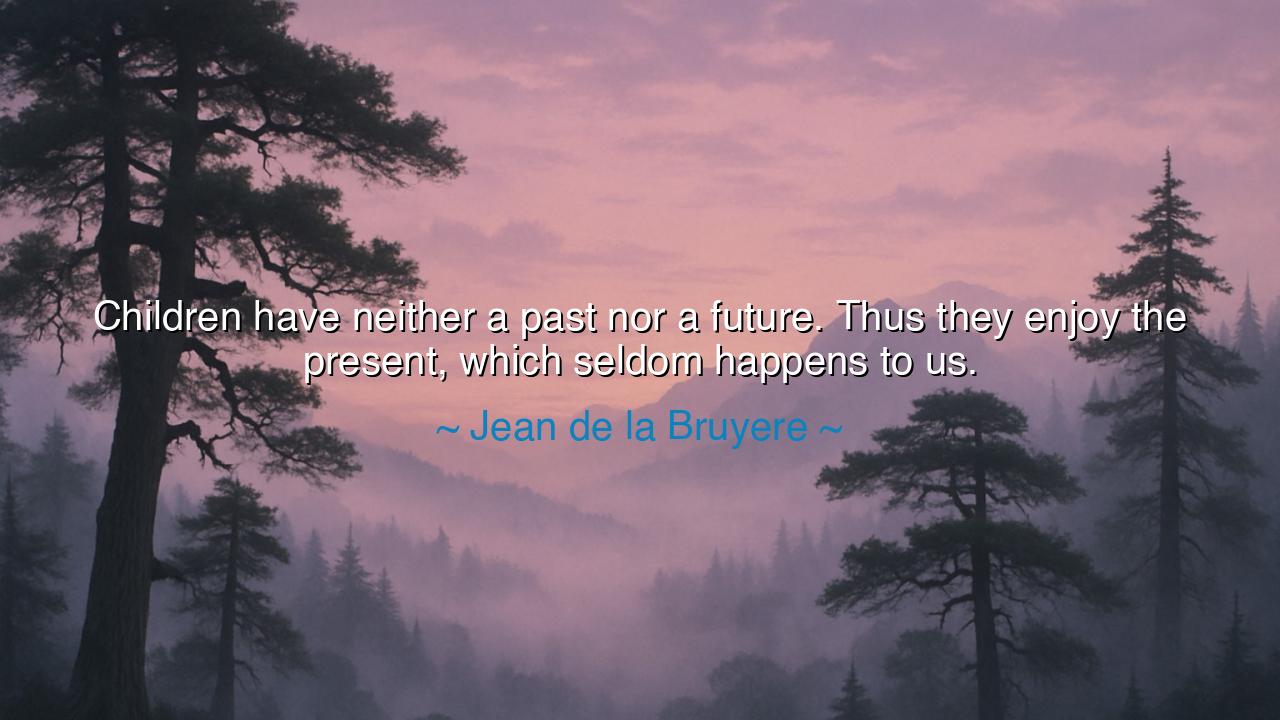
Children have neither a past nor a future. Thus they enjoy the
Children have neither a past nor a future. Thus they enjoy the present, which seldom happens to us.






"Children have neither a past nor a future. Thus they enjoy the present, which seldom happens to us." These profound words by Jean de la Bruyère invite us to reflect on the nature of time, joy, and the human condition. The innocence and purity of childhood are marked by an unshackled existence, unburdened by the weight of past mistakes or the uncertainty of the future. It is in this present moment, free from the constraints that the rest of us face, that children find their truest form of happiness. The young ones, unlike adults, have no attachments to yesterday’s regrets or tomorrow’s uncertainties. They live fully in the now, embracing each second with unadulterated joy, a joy that is increasingly rare for those who have traversed the long road of life.
As we journey through life, the past becomes a heavy cloak we wear, filled with memories, lessons, and regrets. The future remains an uncharted territory, a land of hope, fear, and aspirations. In the midst of these, the present is often lost, slipping through our fingers like sand. Adults, bogged down by their responsibilities, their dreams, their worries, seldom find themselves able to enjoy the moment. As Seneca, the great Stoic philosopher, once said, “We suffer more in imagination than in reality.” This speaks to the tendency of humankind to focus on what is not yet here, rather than what is before us, and it is this very habit that robs us of the joy children experience so naturally.
Consider the example of Alexander the Great, who, though he conquered much of the known world, did not enjoy the spoils of his success. His mind was always fixed on what he had not yet achieved, always looking ahead to the next battle, the next kingdom, the next conquest. His youthful exuberance—his ability to experience joy in the present moment—was eclipsed by his relentless pursuit of glory. In the end, despite all his victories, Alexander did not find peace in the present but rather, like so many before him, was consumed by an unquenchable thirst for more. The lesson here is stark: those who live too far in the past or the future never find the peace and fulfillment that comes from fully embracing the now.
In stark contrast to this, children teach us the invaluable lesson of presence. They revel in the simplicity of life, from the joy of a warm meal to the delight of chasing a butterfly. Their joy is rooted in the now—untethered from regrets or anxieties. Their laughter fills the air, unburdened by the heavy thoughts that cloud the minds of their elders. They show us that happiness lies not in the attainment of distant goals but in the richness of what is right before us, in the moment we are living. To see the world through the eyes of a child is to rediscover the magic of the present—to experience each day as though it were the first, and the only one that matters.
But as we grow, we forget how to do this. We are taught to plan, to look ahead, to reflect on what has been. These are the traits that help us to survive, to succeed, and to build a life. Yet, in our pursuit of goals, we often forget that life is happening right now. The joy of today slips away unnoticed, lost in the chase for the next milestone. This is not to say that planning for the future or learning from the past is wrong. It is essential for growth. However, de la Bruyère reminds us of the importance of balance, of understanding that we must not let the future or the past steal away the present.
To live as children live—present and free, without worry or regret—is not a call for irresponsibility. It is a reminder that in each moment lies the opportunity for joy, for peace, for life itself. The lessons from ancient wisdom tell us that mindfulness, the art of living in the present, is one of the highest forms of wisdom. Buddha himself spoke of this truth when he said, “Do not dwell in the past, do not dream of the future, concentrate the mind on the present moment.” To live with full presence, as children do, is to cultivate a deeper awareness of what truly matters—of the people we love, of the work we do, of the joy of breathing and being alive.
Thus, let us heed the lesson of Jean de la Bruyère and the children who walk amongst us, unburdened and fully engaged in the gift of now. Let us take a moment today to stop and look around us, to take in the sights, the sounds, the feelings, and to embrace the present. For it is here, in this fleeting moment, that the true beauty of life resides. By learning to live in the now, we will find that the present, so often overlooked, becomes the greatest treasure we can hold.






AAdministratorAdministrator
Welcome, honored guests. Please leave a comment, we will respond soon